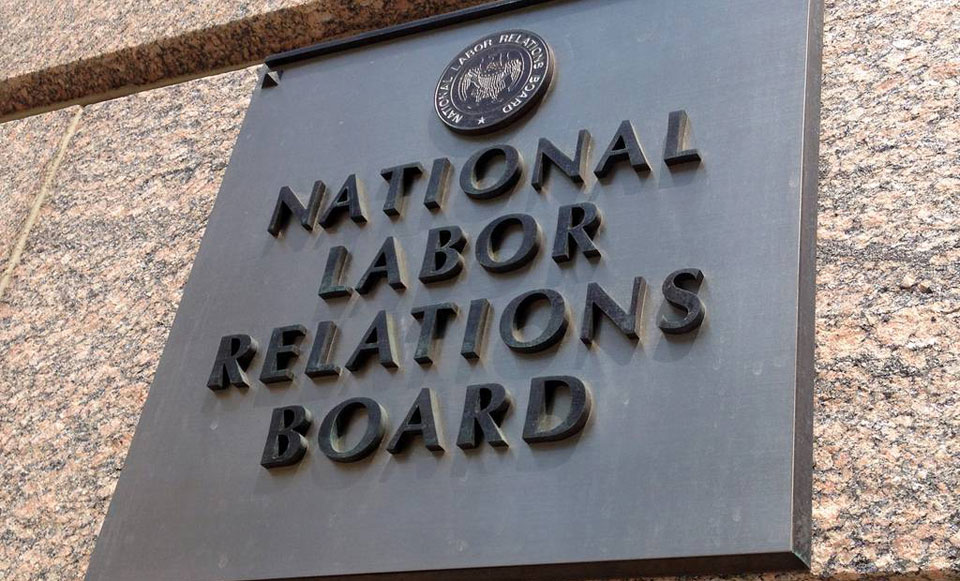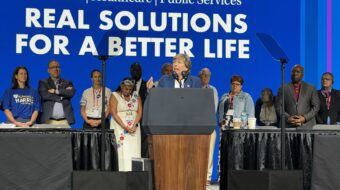
HATTIESBURG, Miss.—Some 530 call center workers at a big federal contractor, Maximus, who handle calls from Medicare and Affordable Care Act clients, are being forced to strike on November 1 over low pay and Maximus’s refusal to do anything about sexual harassment from callers.
The walkout comes just after the workers, and the Communications Workers who are trying to organize them at call centers in Hattiesburg, Miss.., and Bogalusa, La., filed labor law-breaking—formally called unfair labor practices—complaints against Maximus with the regional office of the National Labor Relations Board.
One issue which prompted the organizing drive at those two centers, and eight others, is low pay, even in two of the poorest states in the U.S. But workers also have reported to supervisors about sexual harassment from callers—and gotten the brush-off.
Many call center employees are workers of color whom venal employers routinely try to exploit. At the same time the call centers can often be best jobs in poor towns. They’re not official federal employees, thanks to past “privatization” edicts Republican regimes imposed on the government.
The workers in Hattiesburg and Bogalusa have timed their forced walkout for maximum impact on Maximus. They handle enrollment for Medicaid and with the Affordable Care Act for the federal Center for Medicare and Medicaid Services, and “open enrollment” in those two programs—when new clients can join without restrictions—starts November 1.
During open enrollment, the workers, most of them women of color, must toil 24/7 to handle the volume of calls. Including abusive and sexually harassing calls.
Hattiesburg worker Tiffany Murray told CWA she was subjected to sexually explicit remarks by the same caller two days in a row. She reported the abusive caller to her supervisor but was told nothing could be done. “She made me feel like I just should’ve never said anything,” Murray added.
Demand that they act
The workers and the union demand Maximus act against such abuse, by screening calls, letting workers disconnect abusive calls immediately without fear of punishment, and by giving the workers “at least 30 minutes per shift of non-call time during which they can compose themselves and prepare for the next caller” when such abuse occurs, CWA says.
The workers also demand a minimum wage of $25 per hour. Right now, their wages are around half of that, and not enough, according to wage calculation studies, for one adult and one child to live on, even in Mississippi and Louisiana. Raising wages “will not only help us to do our jobs better, it will benefit the consumers we serve and ensure that all Americans seeking health care coverage get the quality support they deserve,” Hattiesburg worker Audrianna Lewis told CWA.
The low pay and the telephoned abuse join with company labor law-breaking against the Hattiesburg and Bogalusa workers as Maximus, following the wink-wink-nod-nod advice of notorious union-buster Jackson Lewis, breaks labor law against CWA’s organizing drive. Its law-breaking complaints are piling up. And Maximus’s labor law-breaking also violates Democratic President Joseph Biden’s executive order to all federal contractors to stay neutral in organizing drives.
The firm’s latest law-breaking came just a week before the CWA filed the complaint with the NLRB regional office which covers Mississippi and Louisiana.
“On or around Oct. 6, 2022,” Maximus broke labor law in Hattiesburg “when it implied a promise of benefits by soliciting grievances from employees during a union organizing campaign,” the complaint, signed by pro-worker attorney Trisha Pande of Chapel Hill, N.C., reads.
Two earlier instances of labor law-breaking by Hattiesburg call center site manager Crystal Hurt extended from late June through August. Hurt illegally told the workers “selecting a union would be futile” and forcing workers “to listen to employer speech urging them to not support the union.”
“Maximus’s clear interference and lack of respect for the rights of the workers to organize their union will not be tolerated,” CWA Secretary-Treasurer Sara Steffens said.
“By filing these unfair labor practice charges, the workers are exercising their right to hold the company accountable for its unlawful actions. Instead of using the workers’ organizing effort as an opportunity to create a better working environment, the company ramped up its union-busting activities,” Steffens’ statement continued.
“Maximus is attempting to intimidate workers into giving up. They will not succeed. The workers’ commitment to fight for a voice on the job remains strong and the support they are receiving from community members, elected officials, and other allies continues to grow. CWA is and will continue to be steadfast in our support of the workers as they continue to fight back and organize their union,” said Steffens, a News Guild/CWA member and ex-organizer for it.
The NLRB was already investigating a complaint saying Maximus broke the law in both Hattiesburg and Bogalusa by selectively enforcing work rules against union supporters and that it denied union reps access to the Bogalusa parking lot—which is not a work space—while letting non-unionists onto it.
And Maximus “instructed off-duty employees to cease encouraging employees to learn about the union in the parking lot adjacent to Bogalusa” and called the cops “to assist” its efforts to clamp down on union organizing activity in the parking lot, that complaint added. Another prior CWA complaint to the NLRB included an illegal threat to close a center if workers unionized.












Comments